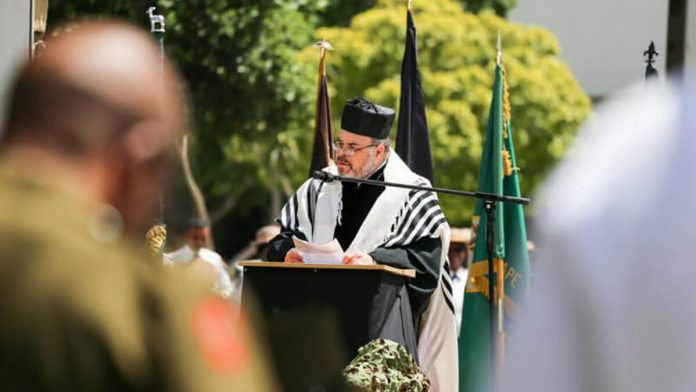Rabbi Stuart Serwator represented the Jewish community at the Remembrance Day ceremony held at the Cenotaph war memorial on Heerengracht, by invitation from the Cape Town Beth Din, on 11 November 2019.
The idea to observe silent remembrance for those who died for their countries emerged globally after WWI, for which 245,419 South Africans of all races volunteered in military services. In 1918, many areas in South Africa called for a halt of activity at midday to ‘direct the minds of the people to the tremendous issues which are being fought out on the Western Front’. Then-mayor of Cape Town Sir Harry Hands made this policy official in May of the same year. On 14 December 1918, following the signing of the armistice in November, Capetonians showed an impressive public display of remembrance. At the firing of the midday gun —which we have all come to know and love— traffic came to a halt, hats were raised and Cape Town communities stood in silence as the Last Post and Reveille sounded in the streets.
Rabbi Serwator called the recent commemoration an impressive and sobering annual event, where he was seated next to the only other faith leader in attendance, a Tswana Congregational Church minister from Vryburg. The minister currently serves as a Chaplain in the South African Navy and is stationed in Simonstown.
“He was visibly impressed when I told him that Vryburg and Mafikeng had Jewish communities,” the rabbi said.
During his speech, for which he lit a symbolic candle, Rabbi Serwator pointed out that ‘remembering is intrinsic to Judaism and features in prayer services daily’.
“In short, we must learn from history. G’d wants us to build a better world on the bases of faith, freedom and justice.”
Quoting then-Chief Rabbi Professor Israel Abrahams’ speech at Remembrance Day 1951, he emphasised that today’s society needs to become ‘better women and men’. He suggested a few practical ways to take better care of one’s community and city.
“Gather clothes we no longer need and donate them to charity. In this way, we clothe the needy. Send get-well-soon cards to relatives and friends who are ill by post, fax, email, WhatsApp… or deliver it in person. In this way, we show care for others. Help a parent with a chore. In this way, we show respect for our elders. Write a thank-you note to someone who has helped you. In this way, we show gratitude. Help someone find what they’ve lost. In this way, we show kindness. Participate in a local park, river or beach clean-up. In this way, we express care for our environment. Lastly, interview a grandparent, elderly relative or friend and write down their life stories. In this way, we honour elders and show care for transmitting traditions and histories. This is appropriate for Remembrance Day. By doing these things, let each of us be the flame making the dreams come true of those who died defending South Africa!”
He ended his speech by chanting the Hazkarah. Following the event, several people told him how happy they were that a rabbi attended, speaking and singing. After the ceremony, the City of Cape Town hosted participants for lunch at the Civic Centre, where Rabbi Serwator was accommodated with a kosher meal from Café Riteve.

Rabbi Stuart Serwator and Kevin Ashton, the Honorary Life Vice President of the Gunners’ Association Western Province 
Mayor Dan Plato and Kevin Ashton among others respectfully lower their heads during prayer 
Rabbi Serwator
Visit the Cape SA Jewish Board of Deputies website, www.capesajbd.org for information and news.
To read or download the full March issue PDF of the Chronicle, click here
To read the Editor’s column for March, click here
To read the most read article of the February issue, click here
Portal to the Jewish Community: to see a list of all the Jewish organisations in Cape Town with links to their websites, click here











